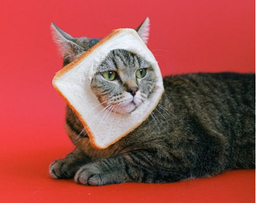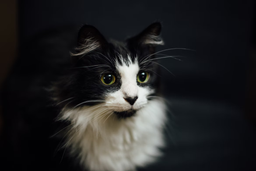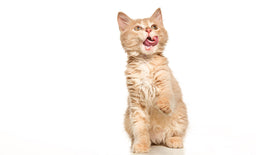Can cats eat porridge? Untamed serves the truth about it!
Porridge is a popular, healthy breakfast for humans, but can cats eat porridge? You might want to bond with your feline companion by sharing your food or adding some variety to their diet, but grains are not the best food for your cat. Untamed explains whether oats and related products can harm your furry friend and what the best food for cats is.
Oats are delicious, but are they healthy for your cat?
Oats are super nutritious, according to numerous relevant studies. The nutrition content of oatmeal provides exceptional health benefits for humans, as shown in the following table:
|
Vitamin/Mineral |
Composition per 100 g (in mg) |
|
Potassium |
370 |
|
Calcium |
55 |
|
Magnesium |
110 |
|
Phosphorus |
380 |
|
Iron |
4.1 |
|
Copper |
0.23 |
|
Zinc |
3.3 |
|
Vitamin E |
1.7 |
|
Thiamin |
0.50 |
|
Riboflavin |
0.10 |
|
Niacin |
3.8 |
|
Vitamin B6 |
0.12 |
Unfortunately, cats and grains don’t make a suitable match. Your feline friend needs meat to thrive. They are obligate carnivores and cannot absorb essential micronutrients from anything other than meat.
Even though felines can survive on plants, they won’t be happy or healthy. Any plant-based proteins, minerals, and vitamins won’t do any good for your cat. Another nutrient your cat doesn’t need is carbs because kitties should get all their energy from animal protein and fat. Carbs are stored as excess fat, which leads to feline obesity and other health problems. Cats also cannot break down plant proteins, so they won’t be able to extract the essential amino acids from them.
The table below shows the basic nutrient ratio of porridge:
|
Nutrients |
Per 100 g |
|
Protein |
12.4 g |
|
Carbs |
72.8 g (of which fibre 6.8 g) |
|
Fat |
8.7 g |
Oatmeal is higher in carbohydrates than protein. With 401 calories per 100 grams, it’s not a wise dietary option for cats. You can use it as a treat but not as a regular meal replacement. The right portion size would be a fourth of a cup, not more than once a week (if your kitty even likes porridge).
Milk with oatmeal? A big NO!
This might come as a surprise, but most cats are lactose intolerant, and consuming porridge with milk can cause various gastrointestinal issues.
Use water instead of milk, and make sure the meal is soft but not watery. You can also combine porridge with your cat’s favourite wet food to add some flavour. Let the dish cool to room temperature before serving.

Oh, no… Is that milk? I am lactose intolerant, HOOMAN!!!
Source: Pixabay
Potential risks of giving porridge to your cat
Some cats can be allergic to oats. Observe your feline’s behaviour after serving porridge for the first time to check if there are any allergic reactions, especially if you’re raising a kitten. Watch out for the following symptoms:
- Diarrhoea
- Excessive grooming
- Excessive scratching
- Itchy, red, and inflamed skin
- Loose stools
- Loss of appetite
- Vomiting
- Weight loss
If everything goes well, you can continue feeding porridge as an occasional treat, but it must be cooked plain.
Some forms of oatmeal aren’t safe for your cat. These include any oatmeal products with raisins or chocolate because these ingredients are toxic to cats and can result in food poisoning.
Adding oats to your cat’s diet through wet food is the best way to introduce the nutrients in a way your cat’s digestive tract is comfortable with.
Porridge and sugar—works for you, but not for your furry friend
Sugar is a carbohydrate, so it's useless for your cat. They can’t taste it, so it won’t work as a treat either. Unless your cat is severely malnourished, feeding them high-calorie food is never a good option. Consuming sugar regularly will mess up their glucose levels, leading to diabetes.

Oh, no! I shouldn’t have eaten that!
Source: Pixabay
Porridge diabetes diet for cats
When combined with other ingredients like carrots, zucchini, broth, chicken, liver, etc., oatmeal can promote insulin production and strengthen the pancreas. Oats have a low glycemic index (GI) score. GI score shows how particular food types raise glucose levels. The soluble fibre and beneficial compounds in the oats can help control blood sugar.
Check out this simple recipe to make a homemade porridge diabetes diet meal for your cat:
- Take half a cup of lean chicken meat and a half cup of chicken liver
- Add about two tablespoons of oatmeal
- Add some cooked green beans, raw zucchini, and raw carrots
- Use plain broth to moisten and mix the ingredients and get a healthy oatmeal bowl for your cat
Even though this diet can help, you must remember that cats are obligate carnivores. They need meat to stay healthy, and an animal protein meal plan is the only way to keep your cat’s organism functioning at an optimal level. A proper diet of whole meat will prevent diabetes, so there will be no need for oats or vegetables.
Can cats eat oatmeal cookies?
Your cat might enjoy the taste of oatmeal cookies because of the crunchy texture, but this treat is not good for them since most store-bought products contain chocolate and raisins, which are toxic to cats.
If your furry friend enjoys these treats, make tailored variants to ensure they are safe for your feline. Adding tuna or salmon to oatmeal cookies can make them healthier for cats. Keep in mind not to go overboard with these snacks.
Check out the oatmeal cookies recipes that can complement your furry friend’s meals!
Salmon oatmeal cookies
Salmon is excellent for cats, so the following snack should bring some nutritional benefits to your furry friend:
- Squish 50 grams of salmon
- Add 1 egg
- Put a spoonful of oil in a pan
- Once the oil is hot, add the salmon-egg mix to it
- Stir for 5–10 minutes
- Add oat flour and a spoonful of oatmeal to the mixture to make dough
- Preheat the oven to 180 degrees
- Create circles of dough on your baking sheet using a spoon
- Let the dough bake for 15 minutes, and your cookies will be done
Make sure the treat has cooled off before serving it to your cat.
Tuna oatmeal cookies
Tuna is a fantastic source of protein and healthy fats, so your cat will go crazy for the following treat:
- Empty a can of tuna into a bowl
- Add 1 egg and some fish oil (fish oil has anticancer properties and is a great source of omega-3 fatty acids)
- Mix all the ingredients
- Add some oat flour and a spoonful of oatmeal
- Knead the dough until you get a homogenous texture
- Preheat the oven to 180 degrees
- Make dough circles on your baking paper
- Bake for 12–15 minutes
Let the biscuits cool before serving them to your cat.
Worried about feeding oats to your cat? Try safer options
Your cat’s natural dietary needs determine the type of food they should eat. The best food for cats is low in carbohydrates and high in protein. Even though oats are high in protein, they also contain too many carbohydrates, which is why you should limit them in your furry friend’s diet, even if you only serve them as a snack.
Ideally, snacks should also be high in animal protein, and the best options are chicken, turkey, salmon, tuna, sardines, prawns, mackerel, ham, and shrimp as they have the necessary nutrients to boost your cat’s health. If your cat loves oats, the following alternatives can provide some health benefits without jeopardising their well-being:
- Oat grass—You can grow oats indoors easily. All you have to do is sow some organic seeds in a pot, add water, and keep it in sunlight. In a few weeks, you will have a few inches tall stems that your cat can nibble on
- Oat tea—Oat tea is another way to safely incorporate oats into your feline’s diet. To make the concoction, add one tablespoon of organic oats into hot water and let it steep for 15 to 20 minutes. Filter the tea and mix it into your cat’s wet food. You can also use this to moisten their kibble
Remember that treats shouldn’t exceed 10% of your feline companion’s daily food intake. By feeding your feline companion high-quality meals every day, they won’t feel the need to ask for snacks!
Do you want the best food for your cat? Try Untamed!

Finally! Some good food.
Source: Pixabay
Untamed offers the best cuts of fresh whole meat packed with amino acids, so our food contains twice more protein than the industry average. All Untamed products are made according to the highest standards of ethical food production because our ingredients come from sustainable suppliers, and we leave a neutral carbon footprint.
Here are a few reasons to switch to Untamed:
- We don’t use common allergens, so even sensitive felines can enjoy our dishes. We also offer single-source-protein meals for delicate kitties
- Our meals are a natural source of taurine to keep your kitty’s eyesight, heart function, and reproductive health intact
- Untamed’s vet-formulated recipes don't contain vegetables, grains, or meat derivatives but gently steamed whole meat and fish, making them delicious to the fussiest of cats
How to order Untamed delicacies

Untamed—everything your feline friend needs!
Image (c) Untamed
We can deliver a tasty and healthy meal box for your cat within a day. All you have to do is visit our online cat food store and sign up for a tester pack in a few simple steps:
- Visit our Try Now page
- Tell us about your cat
- Select a meal plan and place the order
Right after finishing their trial pack, your cat will start to feel the Untamed effect. Take a look at the benefits of the Untamed diet in the table below (as reported by clients who use our cat food subscription service):
|
Timeline |
Health benefits |
|
Within a week |
|
|
After two months |
|
|
After four months |
|
|
Life-long benefits |
|
Untamed meals don’t require additional preparation, so they are ready to be served right away. Adjust the portion sizes according to your cat’s calorie needs, and your feline will get all the necessary nutrients from our gravy and jelly super tasty dishes!
Check out our other guides to what cats can or cannot eat:
|
|

![Best food for Ragdoll cats in the UK [Broken Down]](http://untamed.com/cdn/shop/articles/featured_best_food_for_ragdoll_cats_uk.jpg?v=1646818249&width=256)

